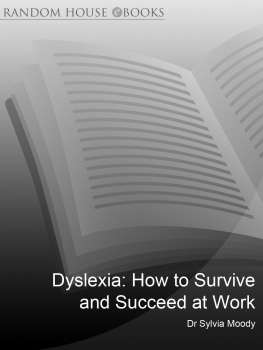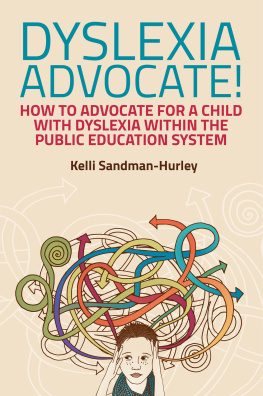Contents
Also by Dr Sylvia Moody:
Dyslexia: A Teenagers Guide (Vermilion, 2004)
Dyslexia: How to Survive and Succeed at Work
Dr Sylvia Moody

Acknowledgements
In writing this book I have greatly benefited from the advice and support of my colleagues:
Diana Bartlett
Susan Close
Katherine Kindersley
I should also like to thank my clients, James, Laura, Gina and Krishnan, for allowing me to transcribe conversations we have had together.
Preface
A note to my reader.
I assume you are a person who either has or is seeking a job, and I would like to ask you the following questions.
Do you consider yourself, as a working person, to be a model of efficiency, the envy of your colleagues and the darling of your managers? Or would you just say you get by reasonably well in an average sort of way? Or do you feel that your working day is a nightmare of inefficiency, anxiety and frustration?
If the last statement is true, do you know why? Is it because you are lazy, unmotivated and incompetent? Or is it rather the case that you feel you have some good abilities, but that these are constantly undermined by baffling inefficiencies? However hard you try, however many hours you put in, your work does not come up to scratch. If this is the case, have you ever considered whether you might be dyslexic?
Dyslexia is a syndrome of difficulties that is well recognised in the educational sphere, but awareness of it in the workplace is partial and patchy. This book is an attempt to remedy that situation.
In the first section of this book Ill explain in detail what dyslexic difficulties are, and how they cause problems in the workplace. I shall also describe a related set of difficulties called dyspraxia. Ill then explain how to go about getting an assessment for these two types of difficulty.
In the second part of the book, Ill suggest strategies that you yourself can use to manage your difficulties, capitalise on your strengths and improve your efficiency at work.
The third part of the book gives information about ways in which employers can offer help and support, and explains how the Disability Discrimination Act 1995 applies to dyslexia and dyspraxia.
I hope that you and your employer will find this book helpful, and that it will enable you to get a fuller understanding of your difficulties and how to overcome them.
Dr Sylvia Moody
Dyslexia Assessment Service
London
CHAPTER 1
WHAT IS DYSLEXIA?
IT MIGHT SEEM obvious that a book on dyslexia should begin with a definition of the term dyslexia. But, alas, this is not possible, because there is at present no agreement among experts on exactly how dyslexia should be defined, or what might be its cause. As the saying goes: two experts, three opinions.
Some researchers adopt a narrow definition of dyslexia: they view it simply as a difficulty with word reading (dyslexia means literally difficulty with words), and they search for the cause of this. Other researchers adopt a wider definition. They view dyslexia as a syndrome, or group, of difficulties that includes problems with literacy skills, memory, perception, sequencing and organisational skills. Researchers who take this view tend to be less concerned with the cause of dyslexia and more interested in its effects.
DYSLEXIA AS A SYNDROME
In this book, I shall adopt this wider view of dyslexia as a syndrome of difficulties, and shall be particularly concerned with how these difficulties affect efficiency in working life. To put some flesh on this syndrome, I present below the experience of a dyslexic client of mine, James, who holds an administrative post in a large organisation.
When James first consulted me, he had no idea that he might be dyslexic. All he knew was that he was experiencing difficulties at work, and that his job was under threat. He described his situation as follows:
In many ways I enjoy my work, and I have the right qualifications for it. But from day to day I seem to get a lot of things wrong. Mainly, its just silly mistakes. Ill get a telephone number down wrongly, or mis-read something, or make spelling mistakes with simple words. It baffles me how these things happen, because I do check my work. I just dont seem to see the mistakes.
Another thing is that Im quite disorganised. I tend to forget appointments, and when Im told anything, it seems to go in one ear and out of the other. Im constantly losing things or filing them in the wrong place. I think one problem is that I feel rushed and stressed all the time. The office is quite noisy and busy and I find it hard to concentrate on what Im doing. I keep changing from one task to another and tend to lose track of whats urgent and whats not.
I often stay late at the office or take work home in order to get something finished, and I can get really exhausted with it all. So it annoys me when my manager makes remarks implying that Im lazy or not conscientious. I dont know why Im so inefficient I feel really stupid sometimes and wonder if I should look for a less demanding job.
Clearly, James was not only irritated by his inefficiencies, but also completely baffled by them. As an intelligent, hard-working and conscientious person, he found it hard to understand why he was always making mistakes and forgetting things.
And it was not only James who felt baffled. His line manager was similarly at a loss to understand his behaviour. In her work review report on James, she noted that:
James has many strengths: he is intelligent and imaginative, and good at problem solving. He is an excellent strategic thinker. However, on a day-to-day basis, he is very careless in his work, and seems to have no concept of deadlines or work schedules. His timekeeping is poor, and he often comes in late, claiming that he has overslept. He seems to make no attempt to improve his work, and in discussions I have had with him about the situation, he has been either offhand and flippant, or surly and defensive. Unless he can improve his work and his attitude, his long-term future with the company must be in doubt.
OPPOSING VIEWPOINTS
It is clear from the above that, while James and his line manager both recognised that there were problems, they saw Jamess attitude to them rather differently. James was annoyed with himself for making mistakes, did his best to correct them, and worked overtime in order to get things finished. In fact he was wearing himself out trying to get his job done properly.
By contrast, his line manager saw him as lazy, slapdash and unco-operative. She tended to view him as being difficult rather than as having difficulties. In consequence, James felt offended and misunderstood. Dialogue between him and his manager broke down.
DYSLEXIA AND RELATIONSHIPS
Nor was it just at work that communication became difficult. Problems also arose at home. When James came for his first meeting with me, he was accompanied by his wife, Laura. It was Laura who had first suspected that James might be dyslexic, but when she tried to discuss this with him he had dismissed the idea, saying he couldnt be dyslexic because he enjoyed reading. Laura described her own feelings about the situation as follows:
James and I used to be very close wed always discuss everything together and sort out any problems. But recently it seems as if theres some barrier between us. I know he has problems at work, but he refuses to talk about them. I get the impression he thinks hes some sort of failure he just mopes around the house all the time and seems to have lost interest in everything. Hes completely shut me out.
Next page











